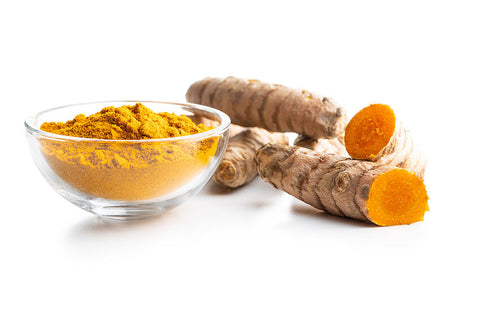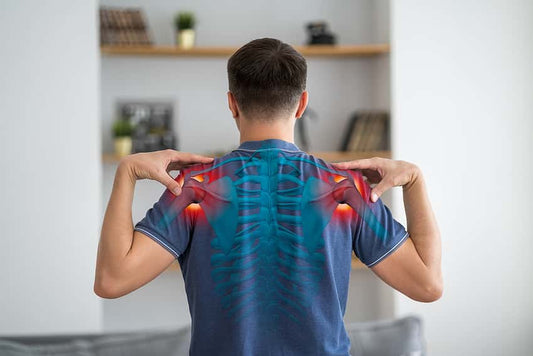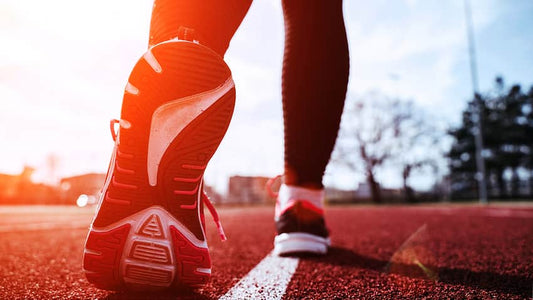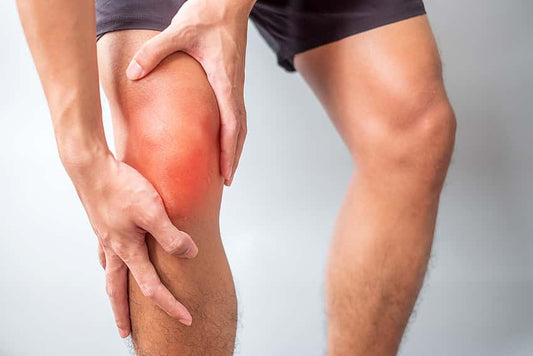If you haven’t heard the news yet, something is spicing up the health and fitness world… it’s called turmeric.
A spice commonly used in Asian and Indian cuisine, turmeric is one of the best wellness hacks for anyone looking for a health boost. It’s an antioxidant and anti-inflammatory and contains dozens of powerful compounds and nutrients that support everything from blood sugar regulation to muscle growth.And whether you’re looking to throw it in a smoothie, add it to energy balls, or bake it into bread, there’s no shortage of ways to use this “gold” and reap all the benefits. For the average wellness joe looking for a health boost, turmeric is an excellent option. But could it be the new superstar for bodybuilders looking for a competitive edge?
In this article, we’re looking at some of the research on turmeric and exercise and giving you the science behind why this golden spice has become a staple for gym junkies.
What Is Turmeric?
With its eye-catching golden yellow color, it’s hard to miss this spice.
But apart from its gold hue, most people would never guess turmeric offers much more than flavor and warmth to cuisines—but it does.
It’s a spice derived from the turmeric root and is part of the ginger family. But unlike ginger, turmeric offers a spicy, earthy, rich flavor with a brighter flesh, lending itself perfectly to Asian and Indian cuisine. Although part of the ginger family, turmeric comes from the Curcuma longa plant, a rhizomatous perennial 1. The rhizome, or tuberous portion of the plant, is dried and ground to create turmeric powder.
On its own, turmeric offers an earthy, bitter, and pungent taste with subtly sweet notes. While most people aren’t keen on consuming it straight, it blends wonderfully with many sweet and savory dishes. But like most spices, when it comes to health-promoting properties, there’s no shortage of them with turmeric—and you can thank its active constituent, curcumin.By nature, the curcumin content of turmeric isn’t high—about 3% by weight 2. That’s why you’ll typically see turmeric extracts or curcumin supplements that are primarily curcumin. However, most doses don’t exceed 1 gram per day.So, what makes turmeric so special?
With more than 100 isolated compounds, the list of bioactivities is almost endless. It contains essential oils (turmerones, atlantones, zingiberene) and curcuminoids, including curcumin, to which many of the beneficial actions are attributed 3.
In Eastern medicine, turmeric has been used for centuries to treat various ailments ranging from liver diseases and rheumatism to diabetic wounds and sinusitis 1. Curious about what all these miracle properties are? Check out this list:
- Anti-inflammatory
- Antioxidant
- Anticarcinogenic
- Anticoagulant
- Antidiabetic
- Antibacterial/antifungal/antiprotozoal/antiviral
- Antifibrotic
- Hypotensive
- Hypocholesterolemic activities
Of those, its anti-inflammatory properties are the most valuable, especially concerning chronic diseases.
Studies show it’s beneficial for managing oxidative and inflammatory conditions, metabolic syndrome, arthritis, and hyperlipidemia, among others.
Still, it may also be helpful for athletes concerning exercise-induced inflammation and muscle soreness, which could enhance and accelerate recovery and performance 4.
Health Benefits Of Turmeric
Although we’re not going to dive deep into the many health benefits of turmeric here, most of them are thanks to its active compound, curcumin. Curcuminoids are phenolic compounds with powerful medicinal properties.
As a compound, curcumin has anti-inflammatory, anti-cancer, and potent antioxidant capacites that can inhibit cell signaling pathways at multiple levels. It also affects cellular enzymes like cyclooxygenase (COX) and glutathione S-transferases, modulate immune function, and more.
The mechanisms behind how are slightly complex, but to reap the benefits of this plant, you must enhance its bioavailability. When paired with a bioenhancer like piperine from black pepper, curcumin’s bioavailability can be increased by up to 2000% 3.So, what benefits do turmeric and curcumin have to offer?
- Mitigates inflammation
- Regulates blood sugar
- Reduces joint pain
- May improve cognitive health
- May reduce the risk of heart disease
- May treat cognitive disorders like Alzheimer’s
- Reduces symptoms of arthritis
- Protects against depression
- May delay aging
- Reduces risk of age-related diseases
But as a fitness supplement, turmeric shines in a few places—let’s check them out.
The Top 5 Benefits Of Turmeric For Bodybuilding
Reduces inflammation
We’ve all experienced sore, aching muscles after a gruesome workout.
And sometimes, even on off days, inflammation can make getting up and moving about challenging—but it doesn’t have to.
While taking an over-the-counter anti-inflammatory might dissipate the pain and discomfort, turmeric offers a far more potent and natural way to reduce inflammation. Studies show that curcumin can reduce the synthesis of several inflammatory mediators, including TNF-α, IL-17, IL-1β, transforming growth factor-β (TGF-β), and cyclooxygenase-2 (COX-2) 5.
By downregulating inflammatory mediators, curcumin may protect against the development of inflammation and inflammatory conditions that ensue.
That said, some level of inflammation is needed to heal, but excessive or chronic inflammation can put a huge damper on it and put you out of the gym for days, weeks, or even months.But perhaps the biggest benefit for bodybuilders is curcumin’s ability to reduce joint inflammation and arthritis, helping you to recover faster—we’ll talk about this next.
Protects joints
There’s no arguing that bodybuilding—and resistance training in general—are hard on the body, especially the joints.
High volume and loads combined with high-frequency training can leave joints sore, achy, inflamed, and less-than-ideal motivation to get back in the gym.
While rest is an essential part of a well-tuned bodybuilding program, adding supplements that support joint health to protect them against inflammation and degradation is key.Studies find that when combined with ginger, another anti-inflammatory, turmeric can improve symptoms of arthritis and improve joint health.
Turmeric’s benefit for joint health is based on its ability to modify the NF-κB signaling, proinflammatory cytokines production, COX-2, and 5-LOX activities to mitigate inflammation before it gets out of hand 6.
May accelerate recovery and reduce muscle soreness
With heavy, high-volume workouts, post-workout soreness is always a big thing, but if you can accelerate your recovery to get you back into the gym faster and stronger, why wouldn’t you?
Turmeric may just be your gold. Thanks to its powerful antioxidant and anti-inflammatory effects, turmeric could be helpful in this department.Rodent studies find that curcumin supplementation can decrease IL-6 and TNF-α in muscle after downhill running-induced muscle damage and suppress hydrogen peroxide and oxidative stress in skeletal muscle 7, 8.
How? The anti-inflammatory property of curcumin inhibited an increase in inflammatory cytokines and creatine kinase, thereby attenuating muscle soreness and DOMS 9, 10.
So, if you’re worried about nagging performance deficits due to sore muscles and eccentric exercise-induced muscle damage, get yourself some turmeric. That said, do keep in mind that some experts argue that muscle damage triggers muscle growth, so subbing in some curcumin or turmeric could work against you and limit potential muscular adaptations.
Reduces fatigue
Training hard is virtually impossible with zero endurance. The best bodybuilders can work through high-volume training systems without losing stamina—and if you’re struggling, curcumin could help.The sensation of fatigue typically arises from exertion beyond one’s normal ability, and during bodybuilding training, it can happen quickly, leading to decreased work output and muscle adaptations.
Although several theories have been proposed for the onset of fatigue during physical exercise, reactive oxygen species (ROS) may be an underlying factor in oxidative skeletal muscle fatigue via cell membrane integrity damage by lipid peroxidation 11. A 2015 rodent study published in Nutrients looked at the effects of curcumin supplementation on fatigue and ergogenic function after physical exertion in mice 11.
The group taking curcumin saw a dose-dependent increase in grip strength and endurance performance and significantly lower levels of lactate, ammonia, BUN, AST, ALT, and CK levels after physical exertion, all of which are markers used to measure fatigue.
Muscular glycogen content was also significantly higher in the curcumin group, suggesting that it could benefit athletes looking to improve exercise performance and prevent fatigue.
May boost testosterone levels
If you want maximum muscle growth, you also want to maximize your testosterone levels (and your androgen receptors).
Testosterone is the male hormone responsible for regulating body fat levels, muscle mass, and libido, among other things.
But it also decreases your risk of metabolic and vascular diseases and protects your brain against cognitive decline.And while resistance training is a surefire way to increase testosterone and growth hormone levels, natural supplements have shown promise for men who struggle with maintaining normal levels. So, how can curcumin and turmeric help? Although many studies are conducted on breast cancer participants, studies show that curcumin exhibits anti-estrogen activity to competitively inhibit endogenous estrogen 12.
Although the effects may not extend to men in the same capacity, high estrogen does interfere with testosterone levels and the ability to gain muscle mass. But in any case, more testosterone typically means better gains, more strength, and a better physique. However, remember that curcumin or turmeric won’t elicit the same effects as something like a natural testosterone booster, but it won’t hurt.Takeaway message: For bodybuilders looking develop the best physique possible, adding turmeric can improve joint function, mitigate inflammation, reduce muscle damage and soreness, reduce circulating estrogen levels, and prevent fatigue.
How Much Turmeric For Bodybuilding?
Although turmeric is an excellent addition to your recovery routine, don’t rely on it to get the job done. Bodybuilding is a demanding sport, and getting your other ducks in a row is vital if you want to sculpt the best physique.But if you’re keen to add some turmeric into your diet, the dosing varies and spans a wide range.
Curcuminoids have been approved by the US Food and Drug Administration (FDA) as “Generally Recognized As Safe” and have good tolerability and safety profiles, even at doses as high as 4000 mg/day 13. So, what’s the best dosage? That depends on what you’re looking for.
For anyone going after its potent anti-inflammatory effects, the JECFA (The Joint United Nations and World Health Organization Expert Committee on Food Additives) and EFSA (European Food Safety Authority, recommended 0–3 mg/kg body weight 14.
Several other studies have also used these dosages with positive results. However, even with a well-established safety profile, some adverse effects have been noted at higher doses, ranging from 500-1,200 mg. To avoid any unwelcome effects, stick to doses under 600 mg. And for even better results, consider something like Performance Lab® Flex—an ultramodern joint supplement curated specifically for active joint demands.
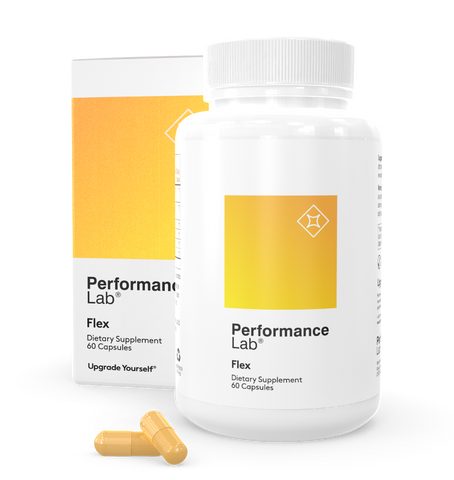
Flex soothes and protects achy joints with easy-on-the-stomach botanicals AprèsFlex® Boswellia serrata and CurcuWIN® curcumin, plus provides lubrication and nourishment with Phytodroitin™, NutriGenesis® strontium, OptiMSM®, and corn glucosamine.
References
- Prasad S, Aggarwal BB. Turmeric, the Golden Spice: From Traditional Medicine to Modern Medicine. In: Benzie IFF, Wachtel-Galor S, editors. Herbal Medicine: Biomolecular and Clinical Aspects. 2nd edition. Boca Raton (FL): CRC Press/Taylor & Francis; 2011. Chapter 13. Available from: https://www.ncbi.nlm.nih.gov/books/NBK92752/
- Tayyem RF, Heath DD, Al-Delaimy WK, Rock CL. Curcumin content of turmeric and curry powders. Nutr Cancer. 2006;55(2):126-131.
- Sharma RA, Gescher AJ, Steward WP. Curcumin: the story so far. Eur J Cancer. 2005;41(13):1955-1968.
- Hewlings SJ, Kalman DS. Curcumin: A Review of Its Effects on Human Health. Foods. 2017;6(10):92.
- Peng Y, Ao M, Dong B, et al. Anti-Inflammatory Effects of Curcumin in the Inflammatory Diseases: Status, Limitations and Countermeasures. Drug Des Devel Ther. 2021;15:4503-4525.
- Daily JW, Yang M, Park S. Efficacy of Turmeric Extracts and Curcumin for Alleviating the Symptoms of Joint Arthritis: A Systematic Review and Meta-Analysis of Randomized Clinical Trials. J Med Food. 2016;19(8):717-729.
- Davis JM, Murphy EA, Carmichael MD, et al. Curcumin effects on inflammation and performance recovery following eccentric exercise-induced muscle damage. Am J Physiol Regul Integr Comp Physiol. 2007;292(6):R2168-R2173.
- Kawanishi N, Kato K, Takahashi M, et al. Curcumin attenuates oxidative stress following downhill running-induced muscle damage. Biochem Biophys Res Commun. 2013;441(3):573-578.
- Drobnic F, Riera J, Appendino G, et al. Reduction of delayed onset muscle soreness by a novel curcumin delivery system (Meriva®): a randomised, placebo-controlled trial. J Int Soc Sports Nutr. 2014;11:31.
- Nicol LM, Rowlands DS, Fazakerly R, Kellett J. Curcumin supplementation likely attenuates delayed onset muscle soreness (DOMS). Eur J Appl Physiol. 2015;115(8):1769-1777.
- Huang WC, Chiu WC, Chuang HL, et al. Effect of curcumin supplementation on physiological fatigue and physical performance in mice. Nutrients. 2015;7(2):905-921.
- Mohajeri M, Bianconi V, Ávila-Rodriguez MF, et al. Curcumin: a phytochemical modulator of estrogens and androgens in tumors of the reproductive system. Pharmacol Res. 2020;156:104765.
- Basnet P, Skalko-Basnet N. Curcumin: an anti-inflammatory molecule from a curry spice on the path to cancer treatment. Molecules. 2011;16(6):4567-4598.
- Kocaadam B, Şanlier N. Curcumin, an active component of turmeric (Curcuma longa), and its effects on health. Crit Rev Food Sci Nutr. 2017;57(13):2889-2895.
